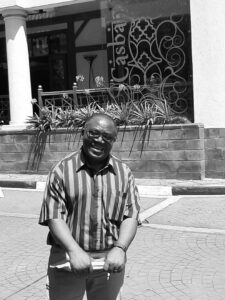
My name is Lubula Mumbere Eugène. I am an economist, holder of a Master's degree from the Omar Bongo University of Libreville since 2004. This training had been funded by the Interuniversity Postgraduate Program (PTCI). Since this year, I teach at the Catholic University of Bukavu. In 2019, I joined the team of researchers at POLE Institute. I worked in the research project „Humanizing Ebola response in the Democratic Republic of the Congo (DRC)“, collaboration of the Pole Instite and the Martin Luther University of Halle in Germany. It goes without saying that the experience gained through this project will benefit the implementation of the present project on Covid-19 diagnosis.
The advent of the Covid-19 pandemic came as a shock to the entire world, including the DRC. In the DRC, the initial tendency was to deny its existence. The measures taken by the government were considered by the Congolese as an untimely, malicious imitation with socially indigestible consequences. For example, quarantine was mistaken for undue imprisonment. Testimonies indicate that the spaces provided for quarantine were generally not sufficiently equipped for dignified living. In some places, the rooms had no mattresses or had mattresses of poor quality. In other places, although well housed, the patients complained of being poorly or inadequately fed; etc.
On the economic side, Covid-19 was the cause of an inflationary episode in the market for goods and services. As the borders were closed, Congolese traders could not obtain supplies from outside. As a result, their stocks began to dwindle to the point where everyday consumer goods became scarce in the face of persistent demands. As a result, prices began to rise. In addition, the market for export goods had shrunk significantly due to the universality of the crisis. The economy became progressively leaner. As a result of this inflation, life appeared difficult to approach for most households. It is worth mentioning, however, that in the face of the shortage of imported foodstuffs, usually from neighboring countries, a certain economic resilience was shown through the resurgence of local foodstuffs. Thus, the threat of famine that everyone feared, especially in Goma, was quickly erased.
As for the research project on the covid-19 test, it is an opportunity to know first of all the various perceptions of the population with regard to this pandemic and the response to it. It would also be interesting to understand the conceptions and apprehensions that the population has about the different tests in a context where the local economy is slowing down. It is also good to know what place the population gives to traditional medicine or to religion in its approach to the disease. Finally, I would be like to learn how families organize themselves to survive when one of their members is confirmed positive.